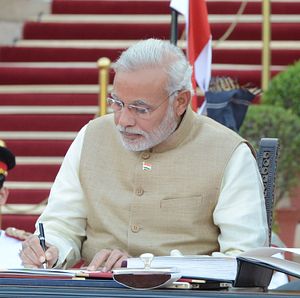The Narendra Modi government’s economic reform agenda still remains far from gaining national consensus in India. Millions still nurture deep-seated doubts about the intent and impact of new economic policies. It was this entrenched skepticism and fear that drove millions of workers from different sectors of the economy to go on a day-long strike earlier this week.
Some 150 million workers, representing ten trade unions including ones from the banking, manufacturing, and construction sectors observed a strike on September 2, asking the government to slow the pace of and even reverse some of its economic policy reforms.
The shutdown comes at a time when the Indian government has been struggling to implement new economic reforms due to parliamentary and political opposition. It also comes at a time when there is a genuine fear in India of an economic slowdown in the wake of trouble in the Chinese economy.
Indian workers, thus, are motivated against the government by a range of issues, including disinvestment in public sector companies and the proposed closure of some of the loss-making government-owned ventures and changes in India’s labor laws aimed at bringing employment practices in tune with the market economy. A new labor law will do away with unions and workers would lose any kind of job security from the companies employing them. There is also a provision that a factory having 40 to 50 workers would be beyond the ambit of the labor law, thereby leaving workers without legal recourse. Finally, workers from unorganized sectors want an increase in the country’s minimum wage.
The impact of the most recent strike was felt most in states like Bihar, West Bengal, Orissa, and Kerala — the states where a large share of workers are still dependent on the public sector. These areas have not benefited from the opening up of the economy in the early 1990s; they lack modern industries and remain largely backward.
More than two decades of economic reforms have brought about a significant shift in the Indian economy. However, privatization is still not an assuring word for many. Therefore there is a vehement opposition to the proposed opening of the Indian railway network, a predominantly public sector venture, to private sector players.
Political opposition to reform remains very strong and it is one of the reasons why the Modi government had to shelve its Land Acquisition Bill recently. Without political consensus, or something close to it, there cannot be reform.
Meanwhile, the government says that it is working on the proposal to increase minimum wages for skilled and unskilled workers. Though Modi promised a new generation of economic reforms to the Indian electorate in the run up to last year’s elections, he has been unable to deliver. Analysts say that no government in India can afford to ignore the deep-seated fear of economic reform in the predominantly rural areas of the country. The government, however, also runs the risk of antagonizing young and urban voters by appearing laggard in taking bold economic decisions.
Last week’s day-long strike by the ten labor unions cannot be taken lightly. India’s workers have sent a message to the government: indiscriminate privatization will not be a politically viable path forward for this government.

































